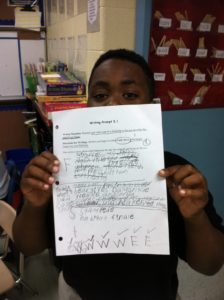Audio feedback in literacy intervention
Research has long shown feedback and revision are associated with increased writing performance. However, teachers struggle with finding time to provide individualized feedback to their students, beyond simple spelling and grammar revisions.
“We can mark 100 words as being misspelled and students can correct the spelling, but it will not make them a better writer,” said Dr. Debra McKeown. “Spelling instruction creates better spellers. Grammar instruction creates better grammarians. Neither are writers. Writing is about ideas. It is about self-expression. It is about clearly organizing thoughts to meet a given purpose for a given audience.”
McKeown is an associate professor of literacy education in the Department of Teaching, Learning and Culture. Her research focus is writing and she has spent countless hours in classrooms observing writing lessons.
“I watched a lot of teachers wander the classroom, peering over shoulders, but they seemed to be looking mostly for productivity; were the students writing not what they were writing,” said McKeown.
She found most teachers gave written feedback via a simple rubric. Most of the written feedback was focused on surface-level features and not content.
McKeown knew from her years as an educational researcher and teacher that the greatest improvements in writing for her students came through strategy-based instruction along with individualized writing feedback. However, she also knew teachers struggled with finding time for more meaningful feedback. She wanted to find a solution.
A key intervention she found is asynchronous audio feedback. Asynchronous audio feedback is spoken feedback that is recorded. In McKeown’s research, the feedback is systematic, specific to a given writing genre and encourages teachers to recognize positives as well as areas of growth.
Through her research, McKeown worked with educators to develop checklists focused on the key genre elements they expected of their students. Teachers can use the checklist or develop their own expectations and focus feedback on specific areas. This helps keep the feedback uniform but also allows for precise adaptations for individual students.
Using the checklist, a teacher gives praise if an element is present. If the element is missing, the student is asked to pause the feedback, make a revision and then restart the feedback.
Teachers have told McKeown they feel more confident about giving this detailed feedback to students on their writing. Students also voiced appreciation saying the detailed feedback is easier to understand and act on than written feedback.
“I found that teachers gave equitable feedback to all students. They gave far more detail and far more praise than was found in the prior written feedback,” said McKeown. “The students loved using the audio feedback because it was private and they would work at their own pace. Teachers felt like they were doing a better job at shaping student writing. Student writing outcomes improved as did their revising behavior in response to this intervention.”
Building foundations
McKeown says it is important to remember that asynchronous audio feedback is not a solution in itself. Planning must be taught and teachers must model how to properly write.
“Instructional time in the classroom equals student achievement. If we want writing to improve, we have to make time in the classroom to teach writing explicitly, not as a sideshow. Nor can we just show/give an example and expect students to learn,” McKeown said.
She said planning is critical to reducing the cognitive load of writing. She suggests teaching students a mnemonic to help them remember the key elements of a genre, then using that mnemonic to plan before they write.
 A mnemonic is a tool that helps you remember certain facts or information. McKeown recalled a mnemonic one of her students made, FAST. To him, FAST reminded him to Figure out how his story started, Add a sequence of events, Sparkle words and Take time to check the prompt.
A mnemonic is a tool that helps you remember certain facts or information. McKeown recalled a mnemonic one of her students made, FAST. To him, FAST reminded him to Figure out how his story started, Add a sequence of events, Sparkle words and Take time to check the prompt.
McKeown said this planning is key in the most important instructional strategy teachers can use: modeling the writing process, from start to finish. She said it is important for teachers to talk out loud about their thinking and using self-statements to demonstrate aspects of writing.
“Writing is hard and students will not see how people write in society. I write for a living and my children have never seen me write anything from start to finish. They see me write grocery lists, address envelopes and sometimes emails to their teachers. When do we think children will see essay writing modeled? Teachers must model this in the classroom,” said McKeown.
COVID-19 benefits
McKeown has found additional benefits to using asynchronous audio feedback during the COVID-19 pandemic because this feedback can be done at a distance. The feedback process is not tied to the class schedule for either the teacher or student.
However, McKeown noted it is important for teachers to not utilize the audio feedback without preparation.
“Teachers will still need to utilize a checklist, rubric or another structured form to ensure concepts addressed are consistent across students,” said McKeown.
The long-term impact
Despite increased demand for writing skills in today’s society, only 27% of the nation’s 8th and 12th-grade students write at or above the proficient level. The concern for McKeown is the lack of priority for writing instruction.
“I hope audio feedback allows teachers to improve writing instruction by providing a path to high-quality, individualized feedback on student writing without trying to fit it into the already limited class time,” said McKeown. “After all, with recorded feedback, 20 students can be listening to their own rich feedback at the same time. When it is recorded, the teacher is holding a personalized writing conference with every student at the same time and the teacher is still available to meet with those students who need two-way communication or additional support.”
You can learn more about McKeown’s research activities by visiting her website.
About the Writer
Ashley is the Media Relations Coordinator and responsible for news coverage in the Department of Teaching, Learning and Culture as well as the Department of Educational Psychology.
Articles by AshleyFor media inquiries, contact Ashley Green.
Fundraising
To learn more about how you can assist in fundraising, contact Amy Hurley, Director of Development ahurley@txamfoundation.com or 979-847-9455














